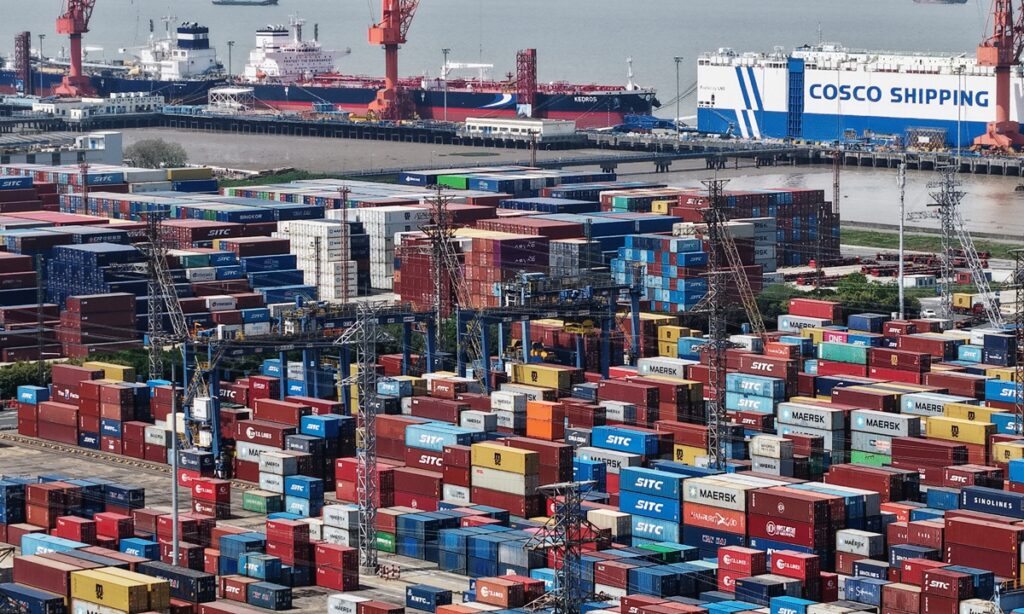By Charubrata Roy
The US has become the biggest destabilizing factor in stoking global economic and trade frictions, severely undermining the international economic and trade order, a spokesperson from the China Council for The Promotion of International Trade (CCPIT) said on Monday.
The US has topped the list in the amount involved in global economic and trade friction measures for eight consecutive months, and has also led in the number of unilateral restrictive measures such as tariffs, controls and sanctions for two consecutive months, said Zhao Ping, the spokesperson for the CCPIT.
Zhao also pointed out that the US has launched probes into copper imports, raised tariffs on aluminium imports, and reinstated the full tariff on steel imports, while promoting its trade policy of “America first” and issuing a memorandum on so-called “reciprocal” trade and tariffs. It prioritized its rules and interests over international norms and global development, severely disrupting the international economic and trade order, normal production and operation of businesses worldwide and lives and consumption of people in various countries, the spokesperson said.
“The US has imposed excessive tariffs on all its trading partners, including China, under various pretexts. These measures have severely undermined the rules-based multilateral trading system and jeopardized the stability of the global economic order. Ultimately, it is businesses and ordinary citizens in the US and other countries that bear the brunt of such actions,” Zhao said.
Commenting on the response from Chinese foreign trade enterprises to the US’ tariff hikes, Zhao said that the CCPIT has conducted questionnaire survey of about 1,100 foreign trade companies nationwide, and nearly half of surveyed companies indicate plans to scale down operations involving the US, with 75.3 percent of them aiming to expand into emerging markets to offset reduced exports to the US.
Surveyed foreign trade enterprises said that frequent tariff changes have significantly increased uncertainty, making long-term planning difficult, Zhao said, while noting that under the support of the government’s comprehensive policy supports, foreign trade enterprises are actively exploring incremental markets and expanding domestic sales to overcome the current challenges.
The global economic and trade friction index for February was also released at the press conference. In February, the global economic and trade friction index stood at 106, indicating a high level of friction. The amount of value involved in these frictions saw a year-on-year decrease of 19.9 percent and a month-on-month drop of 2 percent, according to the CCPIT.
The US, the EU, and South Africa recorded the highest global economic and trade friction indexes among 20 monitored countries and regions. Among 13 major industries monitored, electronics, light industries, transport equipment, non-ferrous metals, and machinery industries were the top sectors seeing trade frictions.
The 20 monitored countries and regions introduced 47 import tariff measures, launched 12 trade remedy investigations, filed 130 Technical Barriers to Trade and Application of Sanitary and Phytosanitary Measures with the WTO, imposed 28 import and export restrictions, and issued 198 other restrictive measures. The tariff index ranked highest, according to the index report.
Regarding China-related trade frictions, the index from 19 countries and regions was 152, up 17 points from January. The amount of trade value involved in these frictions fell by 22.8 percent year-on-year but rose by 13.9 percent month-on-month. The electronic, light industries, machinery, transport equipment, textiles, and chemicals recorded high friction indexes related to China. (IPA Service)

 Remembering Sanjay Singhvi, A Dedicated, Thinking Trade Unionist
Remembering Sanjay Singhvi, A Dedicated, Thinking Trade Unionist 